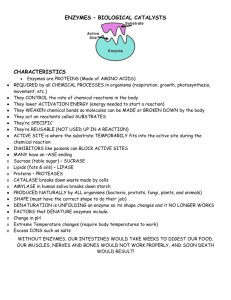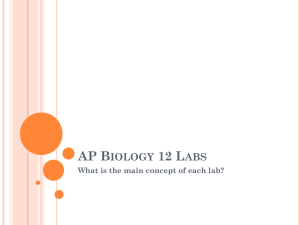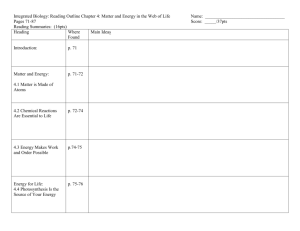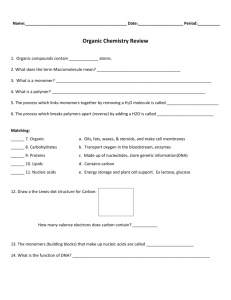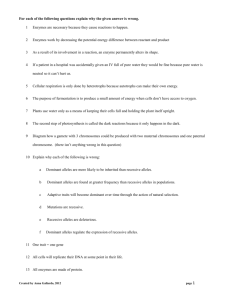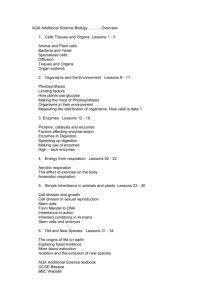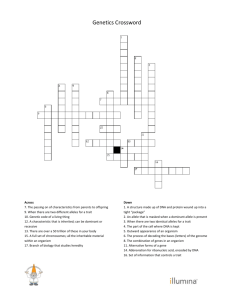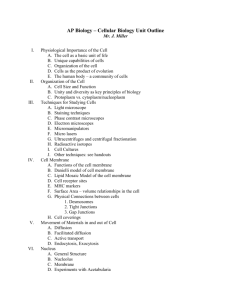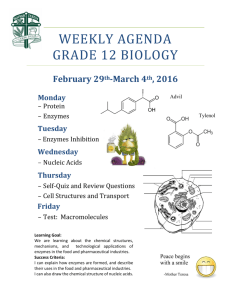Biology Unit 2
advertisement
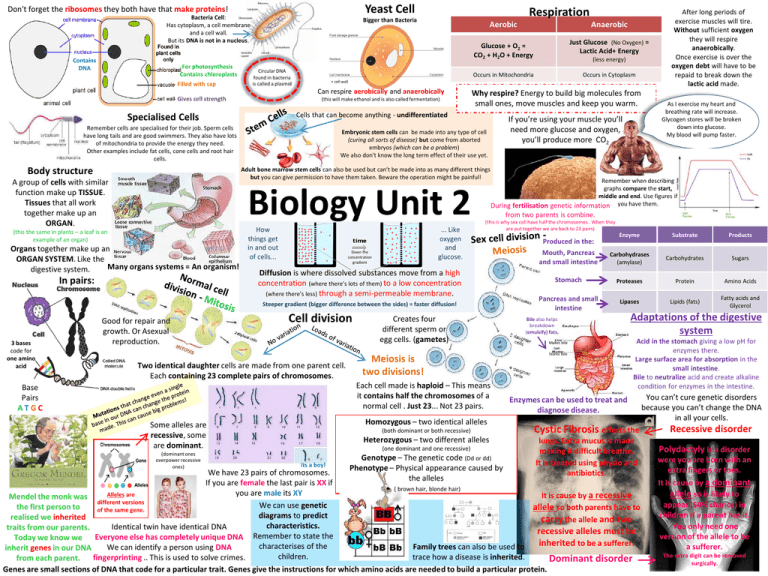
Yeast Cell Don't forget the ribosomes they both have that make proteins! Bacteria Cell: Has cytoplasm, a cell membrane and a cell wall. But its DNA is not in a nucleus. Contains DNA -For photosynthesis Contains chloroplasts - Filled with sap Respiration Bigger than Bacteria Aerobic Circular DNA found in bacteria is called a plasmid Occurs in Mitochondria (this will make ethanol and is also called fermentation) Remember cells are specialised for their job. Sperm cells have long tails and are good swimmers. They also have lots of mitochondria to provide the energy they need. Other examples include fat cells, cone cells and root hair cells. Biology Unit 2 Organs together make up an ORGAN SYSTEM. Like the Many organs systems = An organism! digestive system. In pairs: How things get in and out of cells... ... Like oxygen and glucose. Down the concentration gradient Remember when describing graphs compare the start, middle and end. Use figures if During fertilisation genetic information you have them. from two parents is combine. (this is why sex cell have half the chromosomes.. When they are put together we are back to 23 pairs) Diffusion is where dissolved substances move from a high concentration (where there’s lots of them) to a low concentration (where there’s less) through a semi-permeable membrane. Steeper gradient (bigger difference between the sides) = faster diffusion! 3 bases code for one amino acid Good for repair and growth. Or Asexual reproduction. Cell division Two identical daughter cells are made from one parent cell. Each containing 23 complete pairs of chromosomes. Creates four different sperm or egg cells. (gametes) Meiosis is two divisions! Each cell made is haploid – This means it contains half the chromosomes of a normal cell . Just 23... Not 23 pairs. Base Pairs ATGC Homozygous – two identical alleles Some alleles are recessive, some are dominant. (dominant ones overpower recessive ones) (both dominant or both recessive) Heterozygous – two different alleles (one dominant and one recessive) Its a boy! After long periods of exercise muscles will tire. Without sufficient oxygen they will respire anaerobically. Once exercise is over the oxygen debt will have to be repaid to break down the lactic acid made. As I exercise my heart and breathing rate will increase. Glycogen stores will be broken down into glucose. My blood will pump faster. If you’re using your muscle you’ll need more glucose and oxygen, you’ll produce more CO2 Embryonic stem cells can be made into any type of cell (curing all sorts of disease) but come from aborted embryos (which can be a problem) We also don't know the long term effect of their use yet. Adult bone marrow stem cells can also be used but can’t be made into as many different things but you can give permission to have them taken. Beware the operation might be painful! (this the same in plants – a leaf is an example of an organ) Occurs in Cytoplasm Why respire? Energy to build big molecules from small ones, move muscles and keep you warm. Cells that can become anything - undifferentiated Specialised Cells (less energy) + cell wall Can respire aerobically and anaerobically Body structure Just Glucose (No Oxygen) = Lactic Acid+ Energy Glucose + O2 = CO2 + H2O + Energy - Gives cell strength A group of cells with similar function make up TISSUE. Tissues that all work together make up an ORGAN. Anaerobic Genotype – The genetic code (Dd or dd) Phenotype – Physical appearance caused by the alleles Enzyme Substrate Products Mouth, Pancreas and small intestine Carbohydrases (amylase) Carbohydrates Sugars Stomach Proteases Protein Amino Acids Pancreas and small intestine Lipases Lipids (fats) Fatty acids and Glycerol Produced in the: Bile also helps breakdown (emulsify) fats. Makes bile Stores bile Adaptations of the digestive system Acid in the stomach giving a low pH for enzymes there. Large surface area for absorption in the small intestine. Bile to neutralize acid and create alkaline condition for enzymes in the intestine. Enzymes can be used to treat and diagnose disease. Cystic Fibrosis effects the lungs. Extra mucus is made making it difficult breathe. It is treated using physio and antibiotics. We have 23 pairs of chromosomes. If you are female the last pair is XX if ( brown hair, blonde hair) you are male its XY Alleles are It is cause by a recessive Mendel the monk was different versions We can use genetic the first person to allele so both parents have to of the same gene. diagrams to predict realised we inherited carry the allele and two characteristics. Identical twin have identical DNA traits from our parents. recessive alleles must be Today we know we Everyone else has completely unique DNA Remember to state the inherited to be a sufferer. characterises of the Family trees can also be used to We can identify a person using DNA inherit genes in our DNA children. trace how a disease is inherited. fingerprinting .. This is used to solve crimes. from each parent. Dominant disorder Genes are small sections of DNA that code for a particular trait. Genes give the instructions for which amino acids are needed to build a particular protein. You can’t cure genetic disorders because you can’t change the DNA in all your cells. Recessive disorder Polydactyly is a disorder were you are born with an extra fingers or toes. It is cause by a dominant allele so is likely to appear (50% chance) in children if a parent has it. You only need one version of the allele to be a sufferer. The extra digit can be removed surgically. (they speed up reactions but aren’t used up) A species is endemic if it is only found in one place. Don’t forget enzymes are proteins made up of amino acids. Extinction – the permanent loss of a species Can be caused by… Natural selection means that certain alleles are passed on when a trait is useful for an organisms new environment. To begin with heat will New predators (humans ate all the dodos) help increase collisions New disease between the enzymes When we look at a fossil (Plagues have almost wiped us out several times) and substrates BUT too we can compare them to Geographical Isolation More successful competitors hot and it will denature. see differences and (who would win in a fight, you or a shark?) (remember denature NOT die) When a population similarities which have Dramatic change in the environment- Mass extinction Enzymes are also easily affected by pH changes. becomes physically occurred as an organism (ice age or asteroid strikes) We need highly specific conditions to keep them Remember the active separated by water or ice has evolved. Who knows what got the dinosaurs? working at their best. OPTIMUM CONDITIONS! site is very specific. new species arise. (each enzyme has its own favourite conditions) Only the matching Fossils are the remains of substrate will fit. Useful Enzymes: A new species is formed when organisms are so different organisms in rocks. Proteases used in Enzymes can build they can no longer interbreed .This is Speciation. up or break down baby food. They tell us about substrates. Biological washing Reproducibility: An experiment is better if others Substrates include organisms that lived powders contain carbohydrates, Mean/Average – Add all the values together and can repeat and get similar results. millions of years ago. proteins and fats. enzymes to break divide by the number of values used. This is very difficult when working with nature so you must down food stains. • Can be formed from bone that (remember to leave out anomalies) control as many variables as you can. They work at low temps which uses less electricity and saves the environment. doesn’t decay easily. Median – The middle value of the range. • Can be preserved footprints or Mode – The most frequently occurring value. Control Variables: Things you keep Constant droppings. Quadrats help you • Can (very rarely) happen when no You can use a quadrat to compare two decay has occurred and count the organisms Independent Variable: The thing I change areas placing them randomly something is trapped in ice. in a area. Dependent Variable: The thing that’s measured or or (normally plants) Is there you can move them along a line called a recorded. food? transect and see how things change in (nutrients if an environment moving away of towards you’re a plant) Remember: The bigger the a feature like water. It is difficult to know how life began as there is little evidence for this. Enzymes are biological catalysts sample size the valid and reliable your conclusions Is it warm enough? (temperature) Is there enough light? (more important to plants) Measuring Organisms – See how distribution changes Is there water? Is enough oxygen or CO2? (for respiration and photosynthesis) Leaves are adapted for photosynthesis Super IMPORTANT!!! CO2 + Water For waterproofing Glucose + O2 Greenhouses can use our knowledge of limiting factors to maximise production, Hydroponics is a way of growing making plants grow faster. Data collected can be used to find the range, mean, median and mode. Leaves have a big surface area to absorb as much light as possible This is why you must have chocolate when you revise! Cells with loads of chloroplast for photosynthesis Lots of air spaces for gaseous exchange Stomata to allow gases in and out Chloroplasts are found in The Xylem brings water to the leaves from the roots. The Phloem transports the sugars made in the green parts of plants photosynthesis to the rest of the plant. and contain the chlorophyll plants in water with the perfect balance of nutrients. The temperature is also controlled. Lights are kept on and CO2 is pumped into the greenhouse. Glucose Increasing the temperature will speed up photosynthesis to the point it gets too hot and enzymes denature. To make proteins plants also need to absorb Nitrates from the soil to build amino acids. No nitrates will lead to stunted growth The rate of photosynthesis may be slowed by a lack of light, CO2 or if its too cold. (temperature is a limiting factor as enzymes are effected) Plants also use Magnesium to make chlorophyll No Magnesium = Yellow leaves Limiting Factors Here light is no longer the limiting factor
